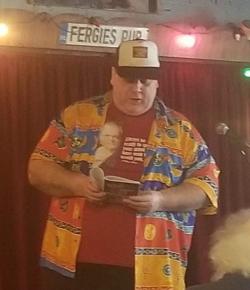MYSTERIOUS DUENDE
Folder:
z NOTES FROM THE CAVERN
I have always been a fan of Federico Garcia Lorca. This Spanish poet was an important figure in Spain in the early part of the 20th Century. His untimely assassination stole a brilliant voice from the literary community. He was a passionate advocate for the human spirit. His life was an ongoing battle with personal and political demons.
His poetry is still readily available to those who wish to read it. New Directions released In Search of Duende as part of their New Directions Bibelot series. Much of his personal strife is not a factor in this volume. Most Lorca readers know that he hid his homosexuality which added a deep nuance to much of his work. This book is largely a celebration of Lorca's love of music.
This volume includes a couple of speeches Lorca gave on Andalusian folk song and multiple poems related to these songs and the guitar. The poems include both the Spanish original and English translations. The translations were done by a number of different people including Langston Hughes, Stephen Spende, Christopher Maurer and W.S. Merwin.
Cante Jonde is Spanish for Deep Song. This is the terminology used for the music. It generally refers to the Andalusian variation of flamenco. Deep Song is the title of the opening speech. This a term for the spirit the artists or musicians are seeking. It is not easily defined because it really connotes an underlying aspect of the music or art. It is something akin to magic or alchemy. Here we get some history on flamenco as well as his ideas on the comparative values of different music.
These speeches are invaluable for understanding what Lorca was about. In spite the politics in which he was often embroiled, he remained very much entrenched in the cultural traditions of his heritage. Lorca was also a singer and was known to perform during his brief life. He gave a brief speech on the significance of the guitar. This leads up to a few poems on the guitar. He had a first hand knowledge of the Deep Song. He was very firm in his belief in the individuality of cultures. He felt that Andalusia should retain the traditional flavor of its culture as it moved forward in the 20th Century.
The essay Play and the Theory of Duende delves into the mysterious powers of duende. Lorca cites Goethe's words on Paganini as the perfect description of duende: “A mysterious power which every person senses but no philosopher explains.” This is an intriguing concept. I guess all artists really search for duende although they may call it by another name. Nietzsche somehow manages to get cited a couple times in this essay. Nietzsche references always seem to pique my interest.
There are a few poems that really stand out. I like the poem simply titled The Guitar (La guitarra) This is the first poem in the book:
The guitar begins its weeping./ The wineglasses of dawn/are shattered. /The guitar/ begins its weeping./It is useless/ to hush it.
Very simple but pretty imagery is utilized here. This runs throughout the volume. Lorca does not go off into politics or deep poetics. Most of the poems are very pretty although they don't have the intensity of much of his poetry. He kept things simple for this volume. This is a nice little collection for someone who wants an introduction to Lorca's poetry. Other volumes like Poet in New York are a lot more powerful but this is a good volume for beginners and completists. Lorca was a brilliant poet and this is a nice little primer.
